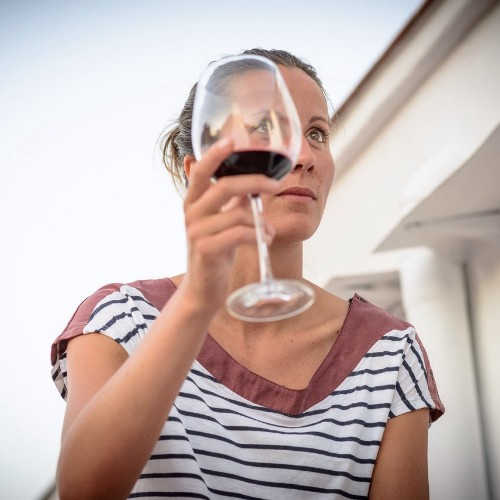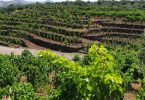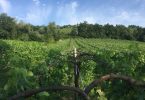The Wolf Post offers a professional service with free access, without subscription.
For this reason, a donation would also be a sign of appreciation for our work.
Magalie Dubois, a doctoral student in wine economics at the University of Bordeaux, seconded to the Burgundy School of Business, has significant experience in the wine sector, not just in the academic field. Her experience as export manager for various agri-food companies is the differentiating factor for the researcher, whose publications, linked to the world of wine and the economy, offer interesting insights.
In this interview, Dubois explores the new perspectives of the wine economy, in a historical period affected by socio-sanitary and geopolitical events that are reshaping the contemporary wine sector.
PhD in wine economics, your searches are developed on several fronts. What studies and professional experiences led you to choose to focus your research mainly on the world of wine?
Unlike many of my colleagues, my professional background was not purely academic. After a double Franco-British master’s degree, I worked for almost ten years as an export manager for various agri-food companies.
Gastronomy is a world populated by passionate and exciting people, I would not see myself working in another sector.
In these ten years, I have gained a very clear vision of what academia could bring to the industry and the desire to resume studies to turn this vision into a tangible reality. Wine was already the subject of my graduation thesis: “Analysis of country of origin effect and consumption situation on attitude towards wine in Turkey – questioning French wine product country”. It is a great example of what economists call experience: before opening a bottle of wine, it is impossible to assess its quality. This feature, combined with the great diversity of producers, grape varieties, climates and brands, makes it an excellent object of study that the current changes in the sector make even richer.
In one of your most recent studies you analyzed the effects of the Covid 19 pandemic on European consumers. Can you explain what your conclusions are on this?
I belong to the European Association of Wine Economists, founded on the initiative of Professor Jean-Marie Cardebat in 2019. Along with 17 other members of the association, we conducted a European consumer survey (which led to the publication of this article), to better understand the impact of the first confinement on the consumption of wine, beer and spirits by Europeans. We have collected over 7,300 responses (huge for an online consumer survey) and can draw some important conclusions:
- The number of people who maintained the frequency of wine consumption during their first birth is significantly higher than those who increased or decreased their consumption. The frequency of wine consumption held up better than that of other types of alcohol (beer and spirits), in particular thanks to the consumption of wines stored at home.
- We explored the possible increase in wine consumption resulting from anxiety and feelings of loneliness. However, the results indicate that the percentage of people who maintained their wine consumption frequency during the lockdown was significantly higher than those who changed behavior. The correlation between the context of anxiety (fear of the economic crisis, fear of the virus, feeling of loneliness or refocusing on oneself) and the increase in the frequency of wine consumption is not significant, if not in part, in France.
- We have also been able to observe a great loyalty of consumers to wine. Respondents who increased the frequency of alcohol consumption also increased the quality. Moderate consumption before the lockdown is positively associated with an increase in the frequency of consumption during the lockdown, especially for pleasure.

©Magalie Dubois
In your study, “The market for wine quality evaluation: evolution and future perspectives”, you wonder how the wine evaluation market has evolved since its inception and if there is still a future for professional wine evaluation. Can you explain your thoughts on this to our readers and consumers?
In the article, I postulate the existence of a true wine evaluation market. The parallel development of scientific knowledge and technical practices in recent decades has had a significant impact on the definition and evaluation of wine quality. It has also influenced how consumers get information on the quality of wine. Significant changes are underway in the wine appraisal market: in areas traditionally reserved for experts, the roles of social media and experts have evolved significantly over the past decade. The growing trust and autonomy of wine consumers and the disappearance of the demarcation between market and prescription are key elements of this analysis. Experts only rate fine wines, and apps offer consumers peer ratings for 85% of wines that aren’t rated by experts.
Climate change makes it increasingly necessary for companies to invest adequately and sustainably. Some have long ago chosen a “nature-friendly” route. Do you believe, based on your experience, that wine economy and sustainability are compatible?
Absolutely.
Not just a pandemic, but also a current, unexpected and suddenly unstable geopolitical landscape. Although it is still too early to draw conclusions, do you foresee that this situation could, if not destabilize, affect in some way the wine economy and its investors?
Absolutely. The current supply crisis and the inflation generated are leading to price increases for all raw materials: glass, cardboard, cork. And transport costs are not excluded. These cost increases threaten the financial equilibrium of the players in the sector.
Political tensions are also slowing trade, closing markets and creating new barriers.
Instability is also climatic. Climate insurance is developing. We recall that last year the Chablis vineyard lost 70% of its harvest due to frosts and hail.
Wine is not a product that adapts quickly to demand, as it takes years for a vine stock to produce its first grapes. Wine time is long and not very compatible with the current instabilities. However, it should be noted that it is strengthening its safe-haven position, particularly for investors (2021 was a record year on the secondary wine market).







